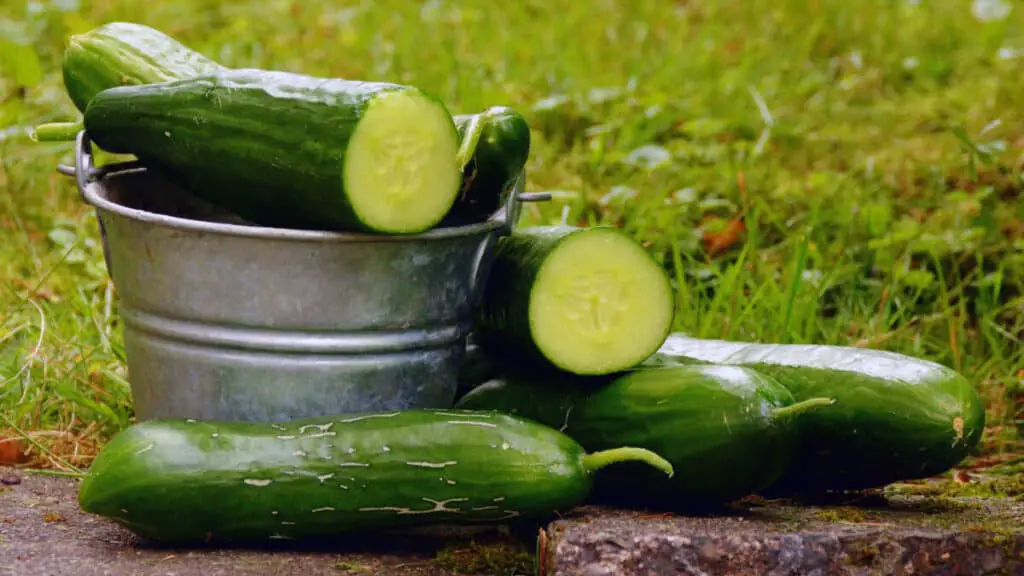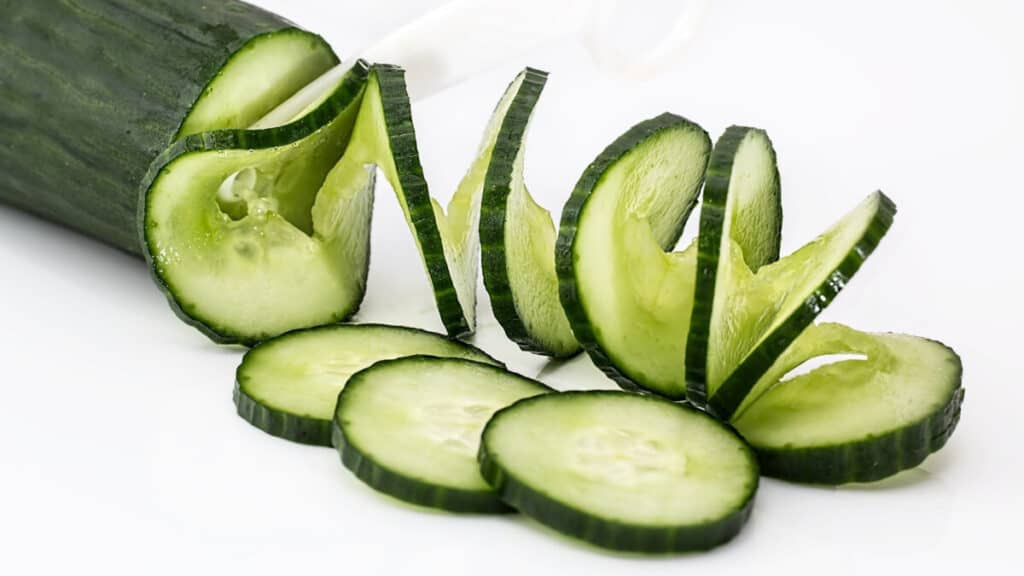Skip To Section
If you love horses, you will know that they can eat quite a variety of things, but some food can be very dangerous to them, so you should always double-check before you feed your horse something new. It’s a good idea to feed small quantities when you’re trialing a new food, even if you know it should be safe for horses.
Can Horses Eat Cucumbers?
Yes, horses can eat cucumbers. They get beneficial nutrients and vitamins from the cucumber, and many horses love them, so it’s definitely a good idea to offer your horse cucumber from time to time, especially as a treat. It’s a great way to enrich your horse’s diet. However, you should feed them in moderation.

You may find that your horse doesn’t eat cucumbers; not all do, and some will prefer other fruits or vegetables. Most love cucumbers, but if your horse doesn’t seem keen, find some other treats to tempt it with.
There are lots of foods they can enjoy, so look for the things they prefer and offer these instead.
However, if your horse is keen, it’s a good idea to offer them this crunchy snack from time to time, especially as part of a balanced diet. There are lots of benefits to be reaped from the consumption of cucumber, and like people, horses can benefit from a varied diet.
You can keep cucumbers in your pocket during training sessions, although they are quite a wet vegetable, so you might want to leave them whole until you are ready to offer them to the horse. Carry a small knife and cut the cucumber up as you go.
Benefits
So, why should you give cucumbers to horses? What benefits does the horse enjoy?
Feeding your horse cucumbers gives it access to valuable vitamins.
According to HelpfulHorseHints, cucumbers are low in calories, carbohydrates, and sugars, so they are a great snack if your horse is on the heavy side and you’re watching its weight.
The low sugar makes them suitable for horses that suffer from insulin resistance, too, so bear this in mind. Other treats may be harder to find, and cucumber is a great option.
Cucumbers are mostly water, which is partly why they are so low in calories. Over ninety percent of a cucumber is water, which means they are good for horses that are not drinking enough or may be dehydrated.
Carrying cucumbers on a hot day can be a great way to encourage your horse to take in some water, so give this tactic a try, especially for horses that seem disinterested in water.
Cucumbers have plenty of the vitamins K, C, and A in them, and they also contain antioxidants and potassium. Horses that are lacking in these nutrients will gain particular benefits from consuming cucumber, and if you add it to your horse’s diet from time to time, you’ll know it is getting a vitamin boost to help keep it fit and healthy.
Overall, cucumbers are a great snack and any horse owner might consider adding them to their horse’s menu on a regular basis. However, like all foods, they can cause issues, so let’s look at those next.
Risks
What are the dangers of feeding your horse cucumbers?
Unfortunately, cucumbers can occasionally have some unpleasant side effects, even though they are generally considered reasonably safe for horses to consume.
According to HorseIsLove, these crispy treats can make the horse produce gas, and because horses cannot burp or vomit, this gas often stays in their system. They do not have the ability to bring it back up (one of the reasons that you need to be very careful what to feed your horse).
This can be very serious, as your horse may then suffer from a gastric rupture, and you need to be totally aware of this potential issue. Do not feed your horse large amounts of cucumber at any time.
You may want to cut cucumbers into small pieces and just feed a couple to your horse at a time.
Of course, cucumber will simply not agree with some horses – just as it doesn’t agree with some people. It’s important to establish whether your horse can have cucumber, or whether it upsets them.
Cucumbers may be non-toxic to horses, but that doesn’t mean they will agree with your horse’s body and digestive system.
The very first time you give your horse cucumber to eat, you should be extremely careful, and watch the horse for signs of distress. Only offer it a single piece of cucumber, and see how it responds.
If it eats the cucumber, do not immediately feed it any more, even if it seems keen. One piece is the best way to test whether cucumber is okay.
Keep an eye on your horse for the following twenty-four hours. That may sound excessive, but bear in mind that it can take time for food to have an impact, and it’s better to be cautious.
If all seems well, you can slightly increase the amount of cucumber that you give your horse next time, and again see how it reacts.
If your horse seems able to tolerate cucumber, you can start including it in your horse’s diet from time to time. If you notice any issues, arising, however, you should cut back or stop offering cucumber entirely and see if the issues go away.
Don’t reintroduce cucumber if you have had to remove it from your horse’s diet; there are others you can offer that will prove less risky.
You should avoid giving cucumbers to horses that have known digestive issues, too. If your horse tends to have a sensitive stomach or gets upset by varied foods, you may want to stick to a small food group and not test its resilience toward other foods.
This could save your horse digestive discomfort or pain.
How To Serve
So, how should you feed your horse cucumber?
Well, firstly, cucumbers should always be washed and free from pesticides, chemicals, and other residue. They should be fresh, too.
Don’t feed your horse cucumber that is mushy or has started to mold. It may be unsafe.
Cut up cucumber into chunks. Don’t shred or mince it; you want your horse to chew it up thoroughly, rather than swallowing it whole.
Your horse will probably enjoy the crispiness of the cucumber, but if your horse has problems with its teeth or is not eating well, consider blending up a cucumber and feeding your horse just the cucumber juice.
You should include the cucumber skin in the blend, and remember to keep quantities low.
Your horse should not have more than five ounces of cucumber per day, whether it is eating the cucumber whole or as a liquid. It’s easy to overfeed the liquid, so weigh it before blending.
Don’t give your horse cucumber too frequently; it’s a good idea to offer a range of food including cucumbers, rather than focusing on this one treat, even if your horse really loves them.
Variety is as important for horses as for people, and switching the treats you offer around will help to ensure your horse is getting everything it needs.
Try to give your horse a mixture of all its favorite foods on an alternating basis; this is the best way to ensure it doesn’t end up deficient in anything.

FAQs
So, what other questions might you have about feeding your horse cucumber?
Let’s run through a couple quickly.
How Much Cucumber Can I Give My Horse?
HorseIsLove recommends limiting your horse’s cucumber intake to five ounces per day and no more. However, you may not want to give your horse five ounces of cucumber every day, even if it loves cucumber.
Instead, offer it five ounces (once you have checked cucumber agrees with your horse) on occasion, either as a snack from your hand or in its feeder with other fruits and vegetables. Don’t worry if your horse gets a little more from time to time, but be careful not to feed it too much on a regular basis, because of the issue with gas buildup.
Are Cucumbers Good For Horses?
Cucumbers do offer some significant benefits to horses. Their diverse vitamins are coupled with low calories and sugar levels, meaning that they are suitable even if your horse is plump, and they can make a great diet snack that your horse can enjoy even if it is a bit heavier than it should be.
Feeding your horse cucumber in small quantities will be good for most horses, but bear in mind that not all horses are the same, and not all will react positively to cucumber.
If you think cucumber causes stomach upsets or discomfort for your horse, stop offering it cucumber, and find alternative snacks instead.
Conclusion
Horses can certainly eat cucumbers, and they will gain some significant benefits from eating them on occasion. However, you should introduce them slowly and only feed them as a treat in small quantities.
Horses shouldn’t have large amounts of cucumber as this could cause stomach pain or even gas ruptures.
References
- www.helpfulhorsehints.com/can-horses-eat-cucumbers/
- www.primestables.co.uk/blog/what-can-horses-eat-the-top-20-foods-you-didnt-know-horses-could-eat/
- horseislove.com/can-horses-eat-cucumbers/
- www.thebarkspace.com/can-horses-eat-cucumbers/
- can-pets-eat.com/horses/cucumbers/

